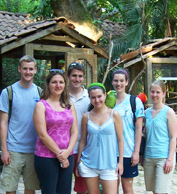Gordon in the News: last updated 08/05/2011
By Jo Kadlecek
You don’t usually need a passport to study the mechanical and physiological bases of human movement. But for Jessica Ventura’s kinesiology students, it helps.
Ventura, assistant professor of kinesiology, specializes in biomechanics and is designing and testing prosthetic devices for lower-limb amputees. But the first year professor from Texas has long been interested in forming partnerships with impoverished communities around the world. So Ventura—who is also fluent in Spanish—launched Gordon’s first Honduras Kinesiology Seminar through the Global Education Office. That meant she and a team of students spent three weeks of their summer vacation in Honduras serving people with congenital and developed physical disabilities unique to the developing Central American nations.
“I wanted to introduce Gordon students to how people live with these disabilities in a society with limited resources,” said Ventura (pictured here front row left in pink with her students). “We found out during our trip that many families with disabled members were either unaware of or unable to seek out services for their needs. That helped us brainstorm new ideas of how to use our training and resources to serve their communities.”
Ventura and her students traveled to Santa Rosa and Copan Ruinas, where they toured public and private clinics, observed and interacted with patients and doctors, visited the Mayan Ruins, forts and a bird sanctuary, and led exercise activities for local children. Because Ventura’s research helps identify correlations between patient feedback on orthotic or prosthetic devices and its effectiveness, Ventura also included her students in several research phases to improve patient care. As technology advances in developed countries, Ventura says that many clinicians will become equipped with better diagnosis tools that aren’t always accessible in poorer communities.
“My goal is to use state-of-the-art tools to identify questions clinicians should ask patients about the fit and feel of their devices,” she said. “If we’re successful, the feedback patients give from these services (which are free) will provide the same insights into the devices that expensive diagnostic tools would, allowing clinicians in poor communities to provide a higher level of care.”
In addition to the research projects, Ventura and her students also began to plan a Special Olympics event for a future trip at soccer fields near one of the clinics to raise awareness about available services. And they worked with a North Shore nonprofit called So We Run to give away over 40 pairs of athletic shoes to rural youth there—teens who are part of a program that teaches self-sufficiency through sustainable development.
“Obviously an opportunity like this prepares our students for careers in occupational or physical therapy,” Ventura said. “But the cultural component is equally important. How people live with unique disabilities within the framework of a country that has limited government support for their needs affects not just their lives and families, but also the type of care we can offer them in the future.”
LEARN MORE:
| Kinesiology Department |
| Global Education Office |
